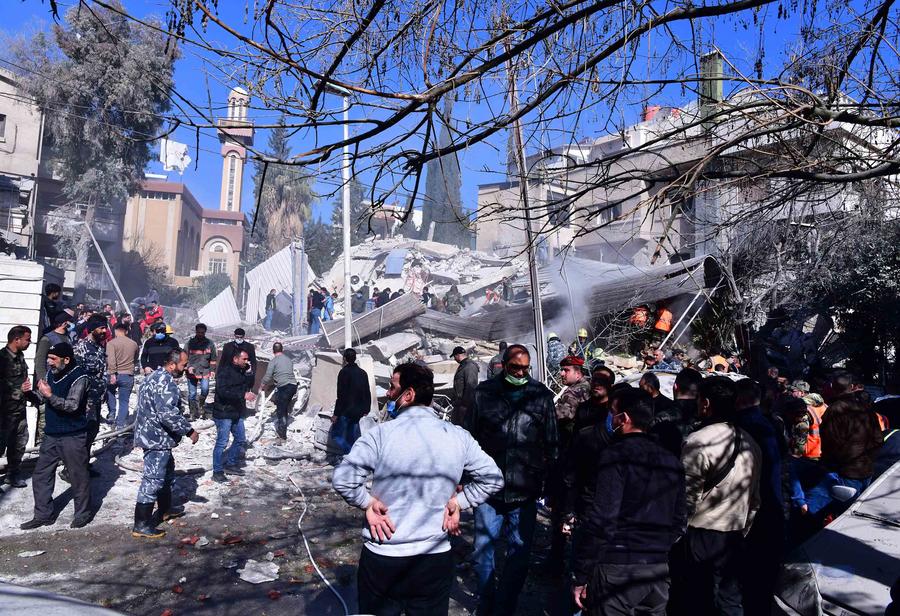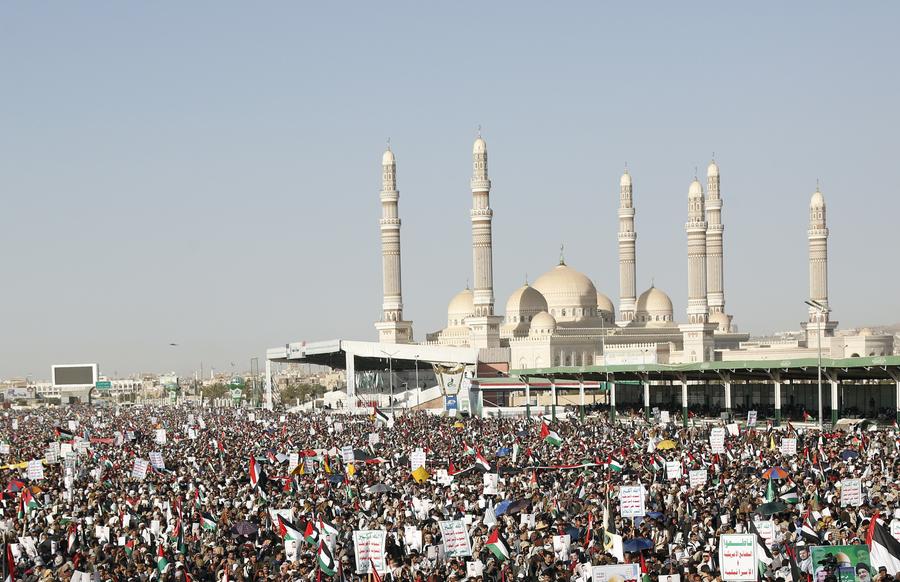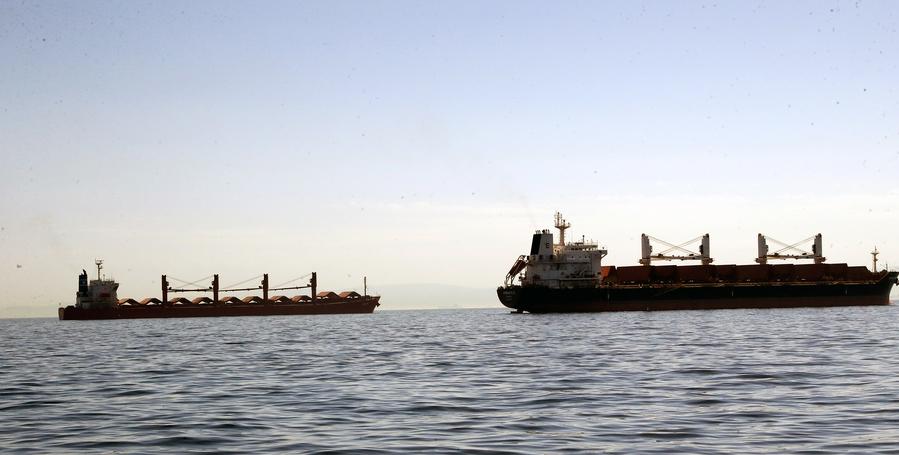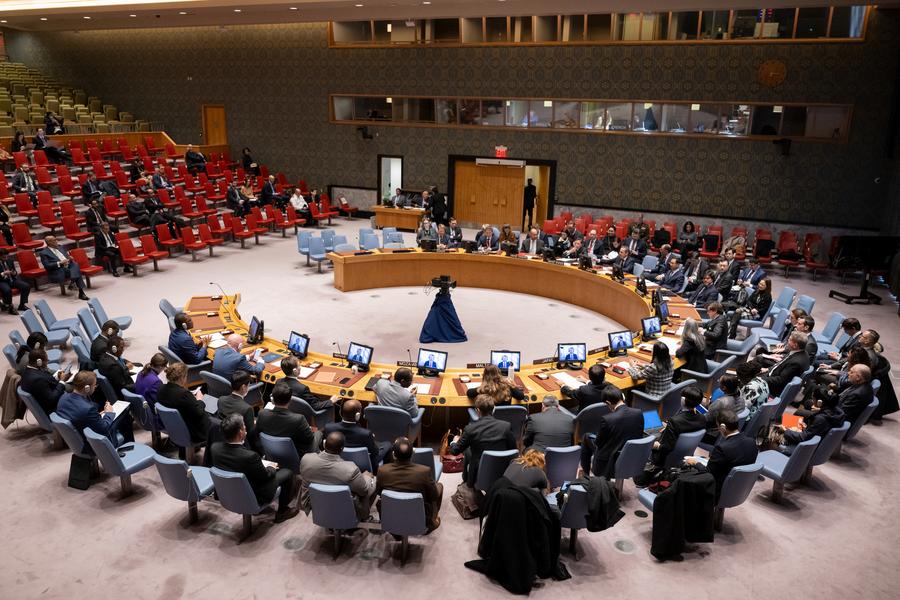Palestinian-Israeli conflict threatens stability of wider region
CAIRO, Jan. 22 (Xinhua) -- The U.S. military announced on Saturday it had attacked a Houthi anti-ship missile in Yemen as the group prepared to launch the projectile into the Gulf of Aden, in the latest flare-up that sparks fears of a wider war in the Middle East amid the ongoing Palestinian-Israeli conflict.
Since the conflict began on Oct. 7, 2023, there have been worries that a regional war is likely to sweep the Middle East. In recent weeks, the Red Sea tensions, increasing attacks on U.S. and Israeli bases in Iraq, and Iranian strikes on targets in neighboring countries, along with the Israel-Lebanon border tension that started on Oct. 8, 2023, have again fueled speculation of a wider war.

People attend a funeral of a Hezbollah military member killed in an Israeli airstrike in Kherbet Selem, Lebanon, on Jan. 9, 2024. (Photo by Ali Hashisho/Xinhua)
DANGEROUS ESCALATION
On Jan. 12, the United States and Britain launched joint airstrikes on the targets of the Houthi group in Yemen. Washington said the strikes were in "direct response" to the repeated attacks on Red Sea ships that had been launched by the Houthis since November last year. The Houthis have been targeting ships that they claim have links to Israel, to retaliate the latter's war in Gaza.
Over the past week, the U.S. military launched five raids targeting Houthi missile launch locations, the U.S. military's Central Command announced Saturday on social media platform X, formerly Twitter. Meanwhile, the Houthi group vowed its attacks on Israeli, U.S., and British ships in the Red Sea and the Arabian Sea would continue until Israel ends its war and siege on the Gaza Strip.
The Red Sea tension chimed with other conflicts in the region. At least two members of the Hezbollah armed group were killed by an Israeli drone in a southern Lebanese village on Sunday, bringing the death toll to 227 on the Lebanese side since the outbreak of the Israel-Lebanon border confrontation.

This photo taken on Jan. 20, 2024 shows a destroyed residential building in Damascus, Syria. (Photo by Ammar Safarjalani/Xinhua)
The Israeli drone attack followed a missile strike that hit a residential neighborhood in the Syrian capital Damascus on Saturday, in which five officers of Iran's elite Islamic Revolutionary Guard Corps (IRGC) were killed.
Last week, Iran launched attacks on targets in Iraq, Syria and Pakistan within 48 hours. Iran said the missile strikes targeted the bases of "terrorists" in Syria and Israel's intelligence service Mossad in Iraq's Kurdistan region. Irritated by the move, Iraq recalled its ambassador from Tehran and summoned the Iranian charge d'affaires in Baghdad, and Pakistan carried out deadly retaliatory strikes against "terrorist" hideouts in an Iranian province.
The events of the past few days have demonstrated how a major confrontation, such as the Israel-Hamas conflict, could potentially set off a chain reaction that results in more tensions and cross-border attacks in the Middle East, said Wang Guangda, secretary-general of the China-Arab Research Center on Reform and Development at Shanghai International Studies University.

Yemenis participate in a rally in Sanaa, Yemen, on Jan. 12, 2024. (Photo by Mohammed Mohammed/Xinhua)
SPILLOVERS OF TENSIONS
Given that the Red Sea is vital to international trade and that the Middle East has the world's largest reserves of oil and other energy resources, the escalation of tension has had devastating economic effects, and countries in the region are the first ones to bear the brunt.
Ship traffic in the Suez Canal, which provides the shortest sea route between Europe and Asia, had decreased by 30 percent since the beginning of 2024 compared to the same period of 2023, due to recent tensions in the Red Sea, said Chairman of Egypt's Suez Canal Authority (SCA) Osama Rabie.
In a report on global economic prospects released this month, the World Bank said "recent attacks on commercial vessels transiting the Red Sea have already started to disrupt key shipping routes, eroding slack in supply networks and increasing the likelihood of inflationary bottlenecks."

Cargo ships enter the Mersin port in Mersin, Türkiye, on Jan. 5, 2024. (Mustafa Kaya/Handout via Xinhua)
"This would have significant spillovers to other commodity prices and heighten geopolitical and economic uncertainty, which in turn could dampen investment and lead to a further weakening of growth," it noted.
Some of the world's largest shipping companies have been forced to circumvent the Red Sea and sought an alternative route for Europe-Asia trade that passes the Cape of Good Hope at the southern tip of Africa, which increases the time of the voyage and shipping expenses.
"If left unchecked, the deteriorating security situation could once again detonate the Middle East," said Nadhum Ali, an Iraqi political expert and a member of the Arab Forum for Analyzing Iranian Policies.
The Middle East is an important energy and commodity transportation hub, and a major conflict in the region will shatter the stability of the global industrial and supply chains, he said.

This photo shows the UN Security Council meeting on Houthi rebel attacks in the Red Sea at the UN headquarters in New York on Jan. 3, 2024. (Manuel Elias/UN Photo/Handout via Xinhua)
CROSSROAD FOR MIDEAST
Notwithstanding the recent round of escalating tension, many observers believe Iran wants to avoid a direct military conflict with either Israel or the United States, but is prepared to mobilize its allies to keep U.S. and Israeli armies busy in the Middle East.
"At present, the possibility of a direct military conflict between Iran and the United States is relatively low," said Imad Salem, a Damascus-based Syrian political expert.
By launching the attacks last week, Iran is clearly warning Israel and the United States that any action against the Islamic countries will receive a similar or even tougher response, he said, adding that Iran also wants to signal its readiness to face an escalation of regional conflicts.
Regarding the Israeli-Hezbollah confrontation, Eyal Pinko, an intelligence and national security expert at the Begin-Sadat Center for Strategic Studies in Israel, said, "the Biden administration doesn't want to go to war, so it puts pressure on Israel not to begin a war."
Analysts say escalated military tensions in the Middle East are not an ideal option for the Biden administration, which has been deeply involved in the Ukraine crisis and faces a tough reelection race in 2024.
Moreover, a wider-ranging conflict is not in the interests of the big powers in the region.
Salem blamed the biased Mideast policies of the United States for contributing to the latest round of tensions, which he said was a spillover of the Israel-Hamas conflict.
"In order to fundamentally resolve the current regional tension and conflict, the Palestinian issue must be resolved in a fair and just manner," he said.
Photos
Related Stories
Copyright © 2024 People's Daily Online. All Rights Reserved.









